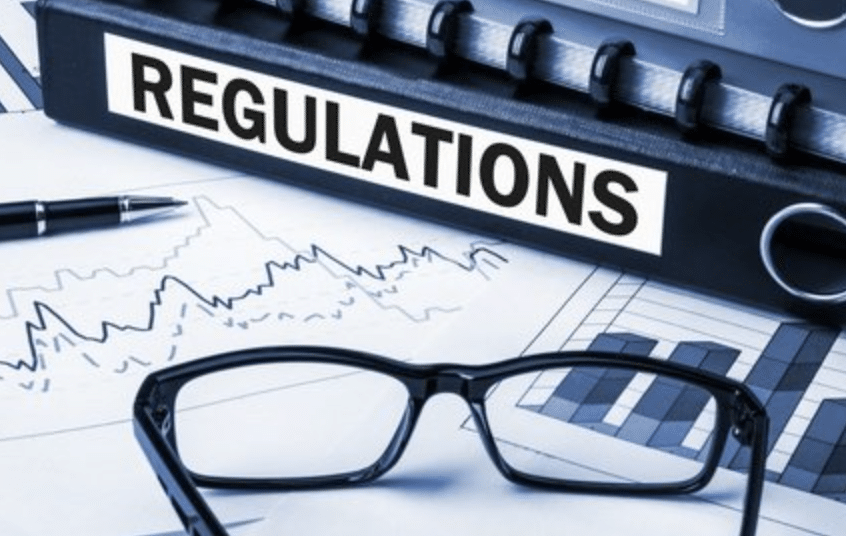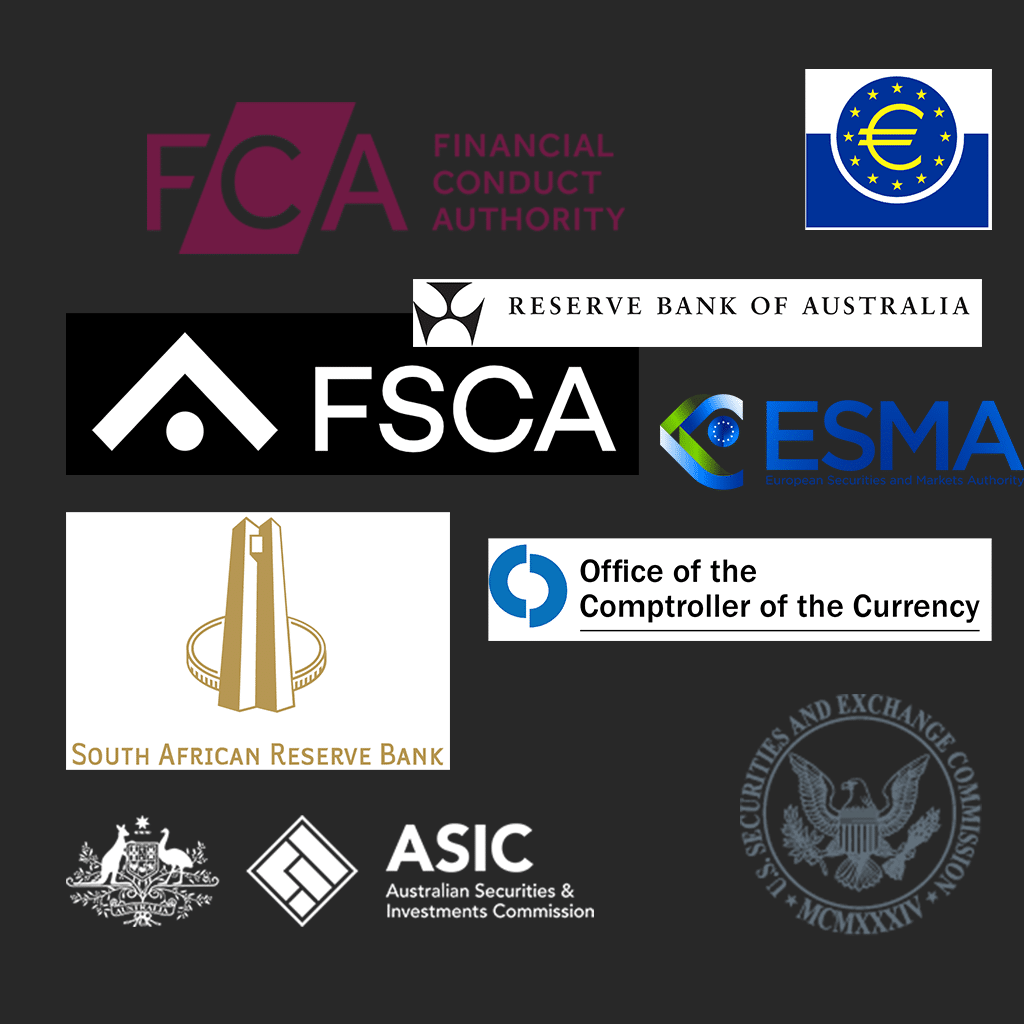In the global financial trading industry, the importance of financial regulation cannot be overstated. It’s the backbone that ensures the stability and integrity of financial systems, making them safe for both institutions and individuals. Financial regulatory bodies play a very important role in this area, acting as the guardians of financial stability. Their presence, guidance and enforcement ensure that the financial sector is transparent, efficient, and fair for all players.
This article will not tell you what the actual financial regulations are. Instead it will help you understand how the financial regulators work and how that can help you as an investor. In the end, it will also give you guidance to important regulatory bodies in different regions.
What Do Financial Regulatory Bodies Do?
Definition: Financial regulatory bodies are institutions or agencies responsible for supervising and regulating players in the financial sector which is good news for you as an investor. Players include banks, brokerage firms, insurance companies, and other financial institutions.
The role & Responsibility of Financial Regulators
- To oversee Financial Institutions: Regulatory bodies keep a close eye on financial institutions, making sure they follow established rules and standards. This oversight is absolutely essential for maintaining the trust in the financial system.
- To implement Monetary Policies: These bodies often have a hand in both shaping and also executing on monetary policies. This could be about influencing interest rates and controlling inflation, in order to stabilize the economy.
- To protect Consumers: One of the primary roles of financial regulators is of course to protect consumers from potential frauds, scams, and malpractices in the financial sector. They try to make sure that consumers will have access to safe financial products and services.
- To ensure Financial Market Integrity: Financial regulators set rules and enforce them with the aim of making the financial markets operate as transparently and fairly as possible, to give investors confidence in the markets.
Enforcement Actions by Regulators: When financial players step out of line, the regulatory bodies’ duty is to set things right.
- To impose Fines: Non-compliant institutions can face hefty fines, hopefully serving as a big enough threat to any potential rule-breakers.
- To issue Cease and Desist Orders: In cases where an institution’s actions might harm consumers or the market, regulatory bodies can immediately order them to stop their activities which of course is a really good protection for investors and the market.
- To revoke Licenses: The most threatening case for financial institutions is that the financial regulators have the authority to revoke the licenses of financial institutions. That is to ban them from continued operations, which can happen after severe breaches.
Public Engagement:
- To educate the Public: Financial literacy is very important. Thus, regulatory bodies often engage in campaigns and initiatives to educate the public. This can be education in various financial matters, all with the aim of helping the public to make informed decisions.
- To provide Platforms for Feedback: Financial regulatory bodies often provide platforms where the public can voice their opinions or concerns about regulations, ensuring a two-way dialogue. With FCA, the financial regulatory body in the UK, this can be done here.
International Collaboration: In our interconnected world, financial activities often span over international borders. For your safety, regulatory bodies collaborate with their international counterparts to ensure stability and integrity in cross-border financial activities.
With this basic understanding, this article will now look deeper into why regulatory bodies are good and further down who they are in different regions.
Why Are Financial Regulatory Bodies Good?
As said, financial regulatory bodies are not just bureaucratic entities; they are there to uphold the integrity and trustworthiness of the financial sector and to protect you as an investor. Let’s look into why these bodies are not just good, but absolutely imperative for the financial markets:

Consumer Protection
For you as a trader to be confident in the financial system, you have to know that your interests are safeguarded. Financial regulatory bodies are your closest friend in this:
- To ensure Fair Practices: These bodies set guidelines that financial institutions must follow, ensuring that you’re not taken advantage of. Whether it’s transparent fee structures or advertising that you can trust, regulatory bodies are there to make sure that institutions play fair.
| Practice | Role of Regulatory Bodies |
|---|---|
| Transparent Fee Structures | To ensure that financial institutions clearly communicate any fees or charges. |
| Honest Advertising | To make sure that financial products are advertised truthfully, without any hidden clauses. |
- Addressing Consumer Complaints: If you ever feel wronged by a financial institution, regulatory bodies provide platforms for you to voice your grievances. They ensure that your complaints are addressed and that justice is served. Here you can complain to the FCA in the UK
Economic Stability
As we saw after the Lehman crash back in 2008, the ripple effects of a financial crisis can be devastating. Stock exchanges all over the world lost a lot of value. Regulatory bodies act as the first line of defense against such events trying to minimize the damage, how?:
- To monitor Systemic Risks: By keeping a close eye on market trends and financial institutions’ activities, regulatory bodies can hopefully identify potential threats to the economy and be able to act on them in time.
- To implement Preventive Measures: Before a bubble bursts or a crisis unfolds, if they see the signs early, regulatory bodies are often able to implement measures to stabilize the situation. This often includes adjusting interest rates up or down, setting stricter lending criteria, or other interventions in the markets.
Investor Trust
For the financial markets to function as smoothly as possible, investors need to trust the system. Regulatory bodies play an important role in both building and also maintaining this trust. How?:
- To mandate Regular Disclosures: Financial institutions are required to regularly disclose their financial health, business activities, and any potential risks. This transparency induced by financial regulators will allow you to make informed investment decisions.
- To ensure Fair Trading Practices: Insider trading, market manipulation, and other unfair practices are things you don’t want to see when you trade. Financial regulatory bodies make rules in these areas that help everyone to a fair shot and level the playing field for all investors.
Control and Oversight
To ensure that financial institutions stay on the straight and narrow, regular checks and balances are of course very important. The regulators:
- Set Standards for Audits: Regulatory bodies define the standards that financial audits must adhere to. This will increase the thoroughness, consistency, and reliability of audits.
- Review Audit Reports for Compliance: Once audits are conducted, regulatory bodies review the findings. If any discrepancies or violations are found, corrective actions are taken by the regulator.

Different Regulatory Bodies have Different Goals
There are many different regulatory bodies that oversee the financial landscape. While they all operate under the umbrella of financial regulation, their specific aims and areas of focus can differ significantly. Let’s look closer into some various aims for regulatory bodies:
Consumer-Centric Bodies
These extremely important bodies have you, the individual consumer, at the heart of their operations. Their primary goal is to make sure that you are treated fairly and transparently by the financial institutions. They will try to:
- Ensure Transparent Fee Structures: These bodies mandate that all fees, charges, and costs associated with financial products and services are clearly communicated to you. There should be no hidden fees and no surprises for you as an investor.
- Address Grievances in a Timely Manner: If you have a complaint or issue with a financial institution, these bodies work on having your concerns heard and addressed as quickly as possible.
Institution-Centric Bodies
These regulatory bodies focus on the financial institutions themselves, making sure the institutions operate within set guidelines and rules and thus help to keep the financial system healthy. How?
- By setting Capital Requirements: To safeguard against potential economic downturns or unexpected losses, these regulators set minimum capital requirements that financial institutions must maintain.
- By monitoring Risk Management Practices: They set rules to make sure that financial institutions have risk management practices in place. This helps protect both the institution itself but also its customers.
Market-Centric Bodies
The market-centric financial regulators look at the broader financial markets. They try to make markets operate more efficiently, transparently, and fairly for all players. How?
- By monitoring Market Trends: By looking at market movements and trends, these bodies can hopefully anticipate potential issues and intervene in time when necessary.
- By preventing Market Manipulations: These bodies work to prevent practices like insider trading or any other manipulative tactics that could affect the market in a way where investors get harmed.
The Balance of Consumers and Financial Institutions
While individual consumers of course need protection, it’s equally important for financial regulators to make sure that financial institutions are stable and that all markets operate fairly. All financial regulatory bodies operate with the primary goal of making sure that we have a stable and trustworthy financial system that can foster economic growth. Still, they have different aims, see the summary below before we go into guiding you to different bodies in different regions of the world:
| Type of Body | Primary Focus | Key Responsibilities |
|---|---|---|
| Consumer-Centric | Individual Consumers | Transparent fees, Addressing grievances |
| Institution-Centric | Financial Institutions | Capital requirements, Risk management |
| Market-Centric | Financial Markets | Monitoring trends, Preventing manipulations |
Regulatory Bodies Around the World

In the United Kingdom
- Financial Conduct Authority (FCA): The FCA is responsible for regulating all financial firms that provide services to consumers to give consumers protection. It also aims to safeguard the UK’s financial system and promote competition to improve conditions for consumers.
- Prudential Regulation Authority (PRA): The PRA is a subsidiary of the Bank of England. It is responsible for the prudential regulation of banks, building societies, credit unions, insurers, as well as major investment firms. The PRA makes sure that these entities have enough capital and take minimal risks in their operations.
In the United States
- Federal Reserve (Fed): The Federal Reserve, often referred to as the Fed, is the central banking system of the U.S. The Fed was established more than 100 years ago, already in 1913. The Fed will supervise and regulate banks, conduct the monetary policy in the US, and additionally provide financial services to banks. It plays a central role in the U.S. economy by influencing employment rates, interest rates and trying to keep inflation close to the 2% mark.
- Securities and Exchange Commission (SEC): Founded in 1934 in the wake of the Great Depression, the SEC’s primary mission is to protect investors as well as maintain fair, orderly, and efficient markets. The SEC requires public companies to disclose meaningful financial information to the public (often quarterly reports).
- Office of the Comptroller of the Currency (OCC): The OCC was established all the way back in 1863. Today it regulates and supervises national banks and federal savings associations. The OCC tries to make sure that consumers are treated fairly and receive the necessary services, while at the same time having their eyes on if banks operate in a safe and sound manner.
In Europe
In Europe the two most important financial regulatory bodies include the central bank (ECB) and the ESMA, see below.
- European Central Bank (ECB): The ECB was established as late as 1998. The ECB manages the euro and conducts the monetary policy for the Eurozone. It works to maintain price stability within the member countries, aiming for an inflation rate of below, but close to, 2% over the medium term.
- European Securities and Markets Authority (ESMA): The ESMA tries to maintain the stability, transparency, and integrity of financial markets within the European Union. It also tries to improve investor protection and keep the financial markets stable.
In Australia
- Australian Securities and Investments Commission (ASIC): ASIC was established in the same year as the ECB, in 1998. ASIC is an independent Australian governmental body that acts as the country’s corporate regulator. It tries to make sure that Australia’s financial markets are fair, transparent, and operate in a way that gives investors confidence.
- Reserve Bank of Australia (RBA): Australia’s central bank was founded in 1960 and is called Reserve Bank of Australia. It sets the country’s monetary policy, issues its currency, and tries to make sure that Australia’s financial system is stable.
In South Africa
- Financial Sector Conduct Authority (FSCA): This financial regulator oversees all non-banking financial institutions in South Africa. The FSCA tries to make sure that all these institutions operate with integrity, transparency, and in the best interests of the South African public.
- South African Reserve Bank (SARB): The central bank of South Africa is called the SARB and it was established in 1921. It oversees the country’s monetary policy, tries to maintain financial stability, and also acts as the government’s banker.
Hopefully, you have now learned more about how the regulatory bodies of the financial world operate and also which one to contact in different cases. Good luck with your trading.
